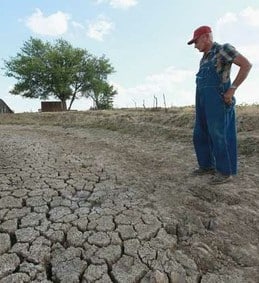

A new study shows that economic losses caused by climate change felt in one part of the world are producing ripple effects everywhere else, thanks to globalization.
Researchers at the Potsdam Institute for Climate Impact Research in Germany and Columbia University in the United States looked at manufacturing and production data in 186 countries covering 26 global industries, ranging from mining to textiles and telecommunications, and matched up results with existing research on temperature effects on workers between the years 1991 and 2011.
The results showed that heat-stress induced production losses have been further amplified by the global connectivity of today’s economies.

“Weather extremes are not really factored into the thinking of a lot of industries, and in particular not weather extremes far away,” says Anders Levermann, climate change researcher at the Potsdam Institute and co-author of the study. “But our study shows it’s really one world with respect to climate impacts.”
Scientists had already demonstrated that when temperatures goes up, labour productivity declines in an almost linear fashion. For instance, three of the global economy’s major industries -construction, agriculture and fishing and mining and quarrying – production declines have been shown to grow by 0.6, 0.8 and 4.2 per cent respectively for each degree in temperature hit above a threshold of 27 degrees Celsius.
The current study adds to the picture by showing how the trade dependencies and worldwide integrated supply chains of today’s economy almost ensure that locally-felt production declines such as those resulting from workers’ heat-stress will have their follow-through impacts on production and economies on the other side of the world.
Globalization and climate change. Are they related?
“The influence of this structural change has dominated over the effect of the comparably weak climate warming during this decade,” say the study’s authors. “Thus, particularly under future warming, the intensification of international trade has the potential to amplify climate losses if no adaptation measures are taken.”

Scientists have produced both positive and negative conclusions about globalization’s effects on climate change and the environment.
On the one hand, efficiency gains linked to integrated supply chains combined with technological progress have been shown to lower stresses on the world’s water resources. On the other hand, critics argue that globalization has led to increased carbon emissions due to the global growth in transportation by land, sea and air.
Climate change is expected to disproportionately affect the health of vulnerable population groups including those living in developing countries, according to a recent report by the United Nations Human Rights Council.
Extreme weather events, disease transmission, deterioration of water quantity and quality are all predicted to hit hardest those in developing countries and as well as people living in geographically vulnerable areas. The World Health Organization estimates that by 2030 climate change could put an additional 100 million people worldwide in extreme poverty.
Leaders of Canada, the United States and Mexico will be meeting on June 29 in Ottawa to discuss transnational relations, with clean energy and climate change policy reported to be first and foremost on the agenda.
When did globalization begin?
So what is globalization, exactly? We seem to have heard the word more and more often of late, but what is it referring to, exactly? According to National Geographic, globalization is about interconnectedness.
“Globalization is a term used to describe how trade and technology have made the world into a more connected and interdependent place,” National Geographic explains. “Globalization also captures in its scope the economic and social changes that have come about as a result. It may be pictured as the threads of an immense spider web formed over millennia, with the number and reach of these threads increasing over time. People, money, material goods, ideas, and even disease and devastation have traveled these silken strands, and have done so in greater numbers and with greater speed than ever in the present age.”
NG suggests that globalization has a long history, offering that it may stretch back to the days of Columbus or even perhaps to the Silk Road and was simply put on steroids by the internet and the Age of Information.
Why did globalization become a bad thing?
If you are hearing the word globalization these days, chances are it is in the context of something negative. The self-described “nationalist” Steve Bannon called Donald Trump’s son in law, Jared Kushner, a “globalist” and a “cuck” and they were regarded as equally bad insults by the media. So when did the “G” word become a dirty word?
Branko Milanovic, writing for the Carnegie Endowment for International Peace says globalization has traditionally been supported by those with the greatest power as a means of expanding their wealth and influence.
“This was the case with the Roman, British and now American-led globalizations,” Milanovic argues. “But recently, the rich West – which saw globalization as a prelude to “the end of history” – is having second thoughts. Two fears drive this unease with globalization: The first is a fear of job loss due to competition from low-wage countries. The second is the fear of ethnic and cultural dilution due to increased immigration.”
Is globalization good or bad?
It’s a complicated subject, but can globalization be boiled down to good or bad, or is it destined to be shades of grey.
Lewis Williamson, writing for The Guardian, says that globalisation (UK spelling) has been a clear failure.
“It is clear that globalisation has failed to rid the world of poverty,” he argues. “Rather than being an unstoppable force for development, globalisation now seems more like an economic temptress, promising riches to everyone but only delivering to the few. Although global average per capita income rose strongly throughout the 20th century, the income gap between rich and poor countries has been widening for many decades. Globalisation has not worked.
But Williamson’s reasoning behind why globalization has not worked my come as a surprise to you.
“The reason globalisation has not worked is because there has not been enough of it,” he says. “If countries, including the rich industrialised ones, got rid of all their protectionist measures, everyone would benefit from the resulting increase in international trade: it’s simple economics. If unnecessary government regulation can be eliminated, and investors and corporations can act freely, the result will be an overall increase in prosperity as the “invisible hand” of the market does its work.”
Globalization and COVID-19
So where do we stand now with globalization in 2021, with a global pandemic upsetting supply chains and hurting the poor disproportionately. Have we forever entered a world of “haves” and “have nots”, where those with no resources bear the brunt of climate change, for instance?
Zachary D. Carter, writing for the Atlantic, says globalization is broken and the result is a situation that is looking nothing short of dire.
“Few ideas today are more unfashionable than globalization,” Carter says. “Across the ideological spectrum, a once-robust consensus about the liberating power of free trade and financial markets has transformed into the conviction that the world has spun out of control. Economic inequality is rising in developing and developed countries alike. Hopes for a global human-rights awakening have given way to frank assessments of the persistence of slave labor and extreme poverty. Climate change is accelerating, diplomatic relations between the United States and China have reached a new nadir, and the European Union has devolved into a forum for resentment. A project forged to spread democracy has brewed a new authoritarian politics on multiple continents. These horrors were evident before the outbreak of COVID-19; the pandemic has escalated them all.”
Imperial Business Insights, writing for Forbes, says COVID-19 is more or less the final bell for globalization to answer.
“COVID-19 is the greatest peacetime disruptor of globalization in the history of the modern world and certainly represents an unprecedented threat to the international trading system. When considering whether COVID-19 will have a permanent effect on the strategies of multinational companies, the answer depends, of course, on how long it lasts, as well as the continuing threat of future pandemics.
But IBI notes that ultimately, consumers may demand globalization with their wallets, if not with their conscious minds, arguing that the lure of cheaper good may trump all and any ideologies.
“Some national governments may use COVID-19 as an excuse to pull back from multilateralism and free trade, leaving them in an interesting position with voters. Although voters may be against free trade in theory, they support it with their wallets when they shop. Walmart, the largest retail chain in the United States, continues to source 70-80 percent of its products from Chinese suppliers.”
Comment
One thought on “How does globalization affect climate change?”
Leave a Reply
You must be logged in to post a comment.



 Share
Share Tweet
Tweet Share
Share




hey